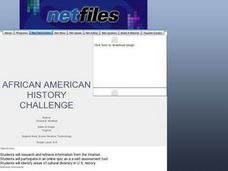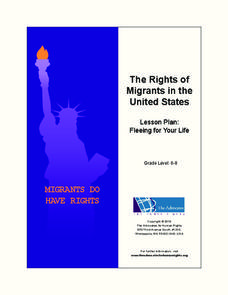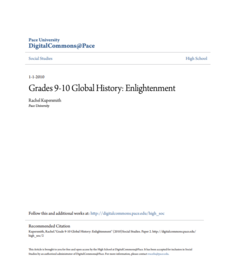Curated OER
African American History Challenge
Students research and retrieve information from the Internet. They participate in an online quiz. They identify areas of cultural diversity in United States history.
Curated OER
Photography and the National Park Service
During the 1800s the United States was expanding westward; land was there for the taking. Kids explore how some early photographers used their photography to influenced the US Congress to save areas like Mirror Lake. They complete a...
Advocates for Human Rights
The Rights of Migrants in the United States Lesson Plan: Fleeing for Your Life
A role-playing scenario has middle-schoolers imagining that they are refugees forced to flee their community and integrate into a new one. Then, some play the roles of members of the new community and the class brainstorms ideas about...
American Battlefield Trust
United States Colored Troops
The debate over slavery contributed to the Civil War, but it didn't stop African Americans from joining the military. Academics complete a series of worksheets, read original letters, and analyze a photo of an African American soldier to...
Curated OER
Constitutional Amendments And Gay Marriage
Upper graders critically examine the history and process of amending the U.S. Constitution in light of the current issue facing the courts on legalizing gay marriage. They read a variety of articles, watch news clips, and develop a...
Urban Education Exchange
Lessons and Units: The Watsons go to Birmingham—1963 5TH GRADE UNIT
Get ready to read The Watsons Go to Birmingham - 1963 with a lesson about historical fiction. Spanning several centuries, the resource prompts learners to guess the historical era of a story based on a word or phrase in the text. In...
Constitutional Rights Foundation
270 Votes to Win: The Electoral College in the United States
What exactly is the Electoral College and how does it work? The instructional activity is part of a larger series on government that explains what the Electoral College is and how it helps determine an election winner. Academics...
Curated OER
New Hampshire Unplugged
Young historians explore how technology and science affected life in the state of New Hampshire. They define technology and give personal experiences of how technology affects people and how people have used technology. They compare the...
Deliberating in a Democracy
Marriage and the State
What defines marriage in society? Scholars investigate the moral and legal arguments of what defines marriage. They analyze different marriage traditions and social customs around the world along with Supreme Court decisions. Individuals...
K20 LEARN
Government and Your Right To Vote: Voting Rights In America
Gaining voting rights was difficult over the course of decades, but the debate over who should actually be allowed to cast a ballot remains. Scholars explore the history of the struggle, including the fifteenth and nineteenth amendments,...
Curated OER
America's Wars, 1898-1945
High schoolers examine the wars the United States was involved in between 1898 and 1945. In groups, they determine the causes and effects of each war and how each war changed the way the United States handled their foreign affairs. As a...
Curated OER
Questions of War and Peace: Using Case Studies to Teach the History of American Foreign Policy
Students read three case studies to focus on how the United States dealt with foreign policy issues. In groups, they read about the decision to drop the atomic bomb, the commitment of troops to Vietnam and wwhether to send troops to...
Curated OER
Is Gulf War Syndrome a Significant Health Issue the U.S. Government has Tried to Cover Up?
Students examine the issues surrounding Gulf War Syndrome. In groups, they analyze evidence from the war and medical information. They participate in a debate in which they support their feelings on whether the government of the United...
Curated OER
U.S. History: Civil War Flash Cards
Eighth graders create flash cards of the leading historical figures of the Civil War. Using media center resources, they laminate their selections and use them to learn their names and faces and as review materials for a test. Along with...
Pace University
Global History: Enlightenment
The core ideas of the Enlightenment—reason, knowledge, and freedom—represented a rebellion against the despotic control of absolute monarchs. As part of the study of the movement, class members assume the voice or either a monarch or an...
Curated OER
Looking at Human Struggle Through The Language Arts Curriculum: The Faces of Slavery
Sixth graders examine the use of slavery in the United States. Using a map, they draw the route of the Tecora and Amistad voyages. Individually, they write an essay describing their opinions on whether the Africans on the ships should be...
Curated OER
Stealing Second: History in the Making
In this Stealing Second: History in the Making instructional activity, students evaluate the internet and newspaper as separate and credible resources. Students analyze Clemente as a baseball player and humanitarian. Students create a...
Curated OER
Getting the Point!
Students explore the American cattle industry history. In this United States history and reading comprehension cross curriculum lesson, students read an article about the history of longhorn cattle, then answer comprehension questions on...
Curated OER
Quilt to Freedom
Students investigate the Underground Railroad. In this African-American history lesson, students listen to the book Clara and the Freedom Quilt and use map skills to identify the various locations in the book. Students create a freedom...
Curated OER
Impacting Indiana
Fourth graders explore Indiana. In this Indiana history activity, 4th graders discuss how Indiana has developed through the years. Students discuss Indiana agriculture and follow a recipe using ingredients from Indiana crops. Students...
Curated OER
Mixing It Up!
Third graders identify the different states of matter. In this science instructional activity, 3rd graders describe the different components of solutions and mixtures. They create emulsions, foams and suspensions in the lab.
Smithsonian Institution
Cuban Missile Crisis
The United States—specifically John F. Kennedy—played a large role during the Cuban Missile Crisis. A history resource poses questions that encourage critical thinking as well as in-depth analysis of images from the time period.
National Endowment for the Humanities
James Madison: Madison Was There
Madison was there! Scholars go on a journey to discover the person behind the founding father label as they explore James Madison's role in the formation of the United States government. The culmination is a writing assignment and...
Constitutional Rights Foundation
Refugees from the Caribbean: Cuban and Haitian “Boat People”
Should refugees fleeing poverty be allowed the same entrance into the United States as those fleeing persecution? High schoolers read about US foreign policy in the late 20th century regarding refugees from Cuba and Haiti, and engage in...

























